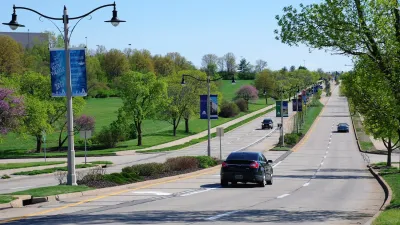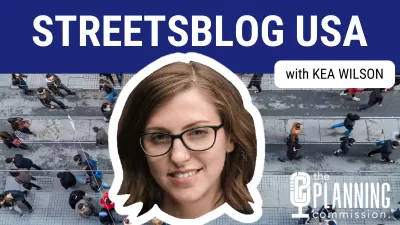Move over XBox; step aside Playstation. The height of game-playing action is free and it's online. The new game in town is University of Minnesota, Intelligent Transportation Systems Institute's "Gridlock Buster". Test your mettle on the increasing levels of difficulty in processing vehicular traffic through a network of intersections.
Move over XBox; step aside Playstation. The height of game-playing action is free and it's online. The new game in town is University of Minnesota, Intelligent Transportation Systems Institute's "Gridlock Buster". Test your mettle on the increasing levels of difficulty in processing vehicular traffic through a network of intersections. As you begin at the bottom rungs of a city traffic department, you're encouraged and coached by a senior traffic group member to take on more challenging conditions as you climb the bureaucratic ladder. If on your watch honking cars max out the so-called frustration meter, you lose your tenure in the city's traffic group and it's back to the mailroom for you. Manage the downtown grid's peak traffic successfully and, eh, well, I didn't exactly get that far. As a matter of fact, my home's proverbial Mayor (that's my wife) was not happy with all the horn honking resulting from my mediocre efforts, and I was forced to submit my resignation (I did try to appeal to her that it should be expected for communities to have a negative initial reaction to changes in signal timings, but she wasn't willing to put up with the grumblings). But look, every public meeting I attend at least one person insists I don't understand their traffic as well as they do (which is usually true), so why shouldn't it be true in Gridlock Buster's fictional Metro too?

Note the mute is on since The Mayor insisted I get a handle on the racket!
Regardless, this game is sure to pique the traffic engineering geek in you and offers a chance at aspiring to the dubious rank of the new Gridlock Demagogue. At the very least, you may come to realize via this game that the modern solution to solving congestion hasn't much to do with answering old-school gridlock gripes. Instead, I have to agree with Sarah Goodyear in her Streetsblog post today that, despite the subtle implications here that there's more to solving congestion than merely futzing with signals, all the modern-day progressive solutions to solving urban congestion are regrettably absent from Gridlock Buster. I was hoping to get the chance to insert a bike lane, assign a Bus Rapid Transit corridor, prescribe a road diet, or maybe even introduce a roundabout. And what about the advanced levels including pedestrian crossings? Search the web as I might, I just couldn't find any of the following cheat codes: BKLANE, BRT, TRFFCLMNG, RNDABT, MXDUSE, PEDPRORTY. Despite these shortcomings, Gridlock Buster is a fun diversion and a great way to introduce younger engineers to the basics of network traffic management. Perhaps Version 2.0 of UMITSI's Gridlock Buster will include transportation demand measures as "assessment options" after each level. In the meantime, try to keep your frustration meter level down low this weekend, and fulfill your lifelong dream at being a traffic engineer!

Planetizen Federal Action Tracker
A weekly monitor of how Trump’s orders and actions are impacting planners and planning in America.

USGS Water Science Centers Targeted for Closure
If their work is suspended, states could lose a valuable resource for monitoring, understanding, and managing water resources.

End Human Sacrifices to the Demanding Gods of Automobile Dependency and Sprawl
The U.S. has much higher traffic fatality rates than peer countries due to automobile dependency and sprawl. Better planning can reduce these human sacrifices.

Seattle Transit Asked to Clarify Pet Policy
A major dog park near a new light rail stop is prompting calls to update and clarify rules for bringing pets on Seattle-area transit systems.

Oregon Bill Would End Bans on Manufactured Housing
The bill would prevent new developments from prohibiting mobile homes and modular housing.

Nashville Doesn’t Renew Bike Share Contract, Citing Lost Federal Funding
The city’s bike share system, operated by BCycle, could stop operating if the city doesn’t find a new source of funding.
Urban Design for Planners 1: Software Tools
This six-course series explores essential urban design concepts using open source software and equips planners with the tools they need to participate fully in the urban design process.
Planning for Universal Design
Learn the tools for implementing Universal Design in planning regulations.
City of Moorpark
City of Tustin
Tyler Technologies
City of Astoria
Transportation Research & Education Center (TREC) at Portland State University
Chaddick Institute at DePaul University
Regional Transportation Commission of Southern Nevada
Toledo-Lucas County Plan Commissions




























